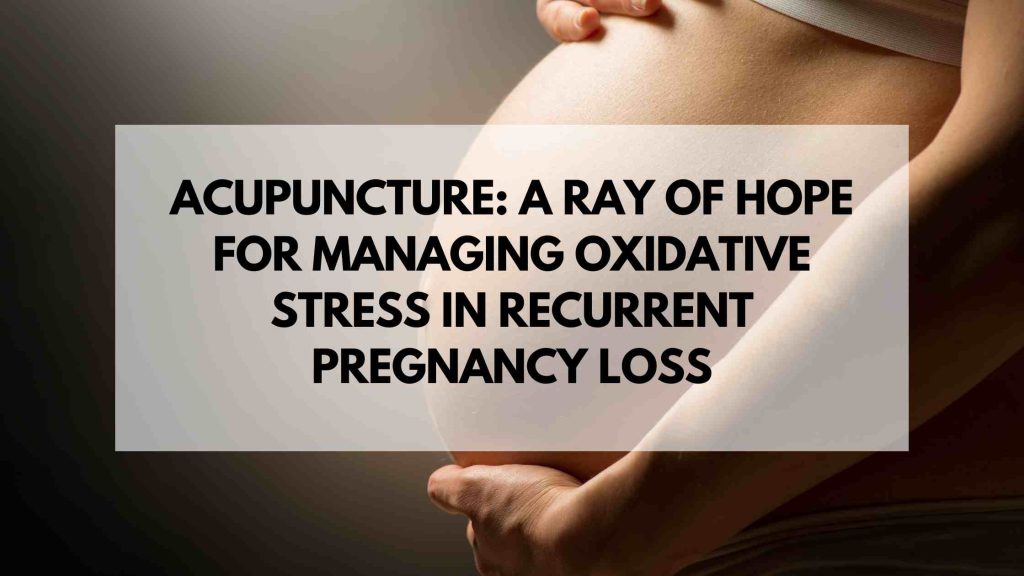Recent studies have showcased an intimate link between oxidative stress (OS) and recurrent pregnancy loss (RPL). Oxidative stress, characterized by an imbalance between the production of reactive oxygen species and the body’s antioxidant defense system, is implicated in the etiology of RPL. The deficient antioxidant protection fails to neutralize the deleterious effects of reactive oxygen species on the developing embryo, leading to pregnancy loss.
In this scenario, acupuncture emerges as a potential therapeutic intervention to combat oxidative stress and improve live birth outcomes. Acupuncture, an ancient Chinese medicine technique, involves inserting fine needles into specific points on the body to stimulate physiological responses. The treatment is believed to enhance blood circulation and modulate the immune system, factors that are crucial for a healthy pregnancy.
What is Oxidative Stress and How can Oxidative Stress Impact Fertility?
Oxidative stress (OS) occurs when there’s an imbalance between the production of reactive oxygen species (ROS) and the body’s ability to counteract or detoxify their harmful effects through neutralization by antioxidants. Reactive oxygen species, including free radicals, are byproducts of metabolic processes within the body. While ROS play certain beneficial roles such as signaling in cellular processes and immune responses, excessive levels can cause cellular damage.
When it comes to fertility, oxidative stress can have detrimental effects on both female and male reproductive systems. Here’s how:
- Egg and Sperm Quality:
- In women, oxidative stress can damage the DNA, lipids, and proteins in the egg, which can lead to reduced egg quality. Poor egg quality is a major concern, especially in older women.
- In men, oxidative stress can affect sperm quality by altering the sperm DNA, reducing motility, and affecting the integrity of the sperm membrane.
- Embryo Development:
- Oxidative stress can impair embryo development by creating a hostile uterine environment. A balanced redox environment is crucial for early embryonic development, implantation, and placenta formation.
- Endometrial Receptivity:
- The endometrium (lining of the uterus) needs to be receptive for successful implantation of an embryo. Oxidative stress can affect endometrial receptivity, making it difficult for the embryo to implant.
- Hormonal Imbalance:
- Oxidative stress can disrupt the delicate hormonal balance necessary for ovulation, menstrual cycle regulation, and maintenance of pregnancy.
- Inflammation:
- Oxidative stress can trigger inflammatory responses which, in turn, could further exacerbate oxidative stress, creating a vicious cycle that may hinder fertility.
- Recurrent Pregnancy Loss (RPL):
- As mentioned earlier, oxidative stress is implicated in the etiology of recurrent pregnancy loss due to its adverse effects on embryo development and implantation.
Managing oxidative stress through lifestyle modifications, nutritional supplementation (like antioxidants), and complementary therapies like acupuncture may offer significant benefits in improving fertility and supporting a healthy pregnancy.
Are there lab tests to check for oxidative stress?
Testing for oxidative stress poses a set of challenges that may limit its clinical utility. Firstly, oxidative stress is a complex and dynamic process that can be influenced by a myriad of factors including lifestyle, underlying health conditions, and even the time of day when the test is conducted. This makes it difficult to obtain a clear, consistent measurement. Secondly, the lack of standardized reference ranges and protocols for oxidative stress testing further complicates the interpretation of results. Many of the markers used to evaluate oxidative stress are not specific and can be altered in various unrelated pathological conditions. Moreover, the tests may require specialized equipment and expertise, making them less accessible in routine clinical settings. Lastly, the clinical relevance of oxidative stress measurements in predicting or managing diseases has not been fully established. Therefore, while these tests can provide insightful data on the oxidative status of an individual, their role in guiding clinical decision-making and improving patient outcomes remains to be substantiated.
The good news is that it is not necessary to have a specific lab test to check for oxidative stress.
Acupuncture as an emerging therapeutic for Oxidative Stress and recurrent pregnancy loss / miscarriage
Several research studies have indicated that acupuncture can significantly reduce oxidative stress levels. By promoting a better antioxidant defense mechanism, acupuncture helps in creating a conducive uterine environment for embryo implantation and growth. Furthermore, acupuncture has been associated with improved hormonal balance, which is vital for maintaining pregnancy.
Moreover, acupuncture treatments have shown promise in increasing live birth rates among women experiencing recurrent pregnancy loss. The practice, being minimally invasive and relatively cost-effective, can be considered a viable adjunct therapy alongside conventional medical treatments.
How does acupuncture reduce oxidative stress?
Acupuncture, a traditional Chinese medicine practice, has been proposed to reduce oxidative stress through several mechanisms, which may contribute to its potential benefits in enhancing fertility and supporting pregnancy. Here’s how acupuncture might exert its antioxidative effects:
- Promoting Antioxidant Activity:
- Acupuncture can enhance the body’s antioxidant defense system by promoting the production and activity of intrinsic antioxidants such as superoxide dismutase (SOD) and glutathione. These antioxidants play a critical role in neutralizing reactive oxygen species, thus reducing oxidative stress.
- Improving Circulation:
- By improving blood circulation, acupuncture ensures a better supply of nutrients and oxygen to various tissues including the reproductive organs. Enhanced circulation also aids in the efficient removal of oxidative products and toxins from the body.
- Reducing Inflammation:
- Acupuncture has anti-inflammatory properties. Since inflammation can exacerbate oxidative stress, by reducing inflammation, acupuncture helps in breaking the vicious cycle between inflammation and oxidative stress.
- Modulating Stress Responses:
- Stress can trigger the production of reactive oxygen species. Acupuncture is known for its stress-reducing properties, and by alleviating stress, it may help in reducing the production of reactive oxygen species, thus controlling oxidative stress.
- Regulating Hormonal Balance:
- Hormonal imbalances can contribute to oxidative stress. Acupuncture can help modulate the endocrine system, aiding in maintaining a hormonal balance that might mitigate oxidative stress.
- Enhancing Cellular Energy Production:
- Acupuncture might enhance mitochondrial function, which is crucial for cellular energy production. Efficient energy production with lesser reactive oxygen species generation can be facilitated by acupuncture, thus reducing oxidative stress.
- Stimulating Neuroendocrine Pathways:
- Acupuncture can stimulate neuroendocrine pathways, which may, in turn, modulate oxidative stress and improve the antioxidative capacity of the body.
These mechanisms collectively contribute to a reduced level of oxidative stress, creating a more favorable environment for fertility and pregnancy maintenance.
If you are experiencing recurrent pregnancy loss, then Acupuncture is worth considering
Acupuncture’s holistic approach not only addresses the underlying oxidative stress but also promotes overall well-being, which is crucial for hopeful parents on their journey to expanding their families. Through individualized treatment plans, acupuncture provides a personalized avenue towards managing oxidative stress, thereby holding a promise in improving live birth outcomes in women with a history of recurrent pregnancy loss.
The most current research shows that a series of 12 acupuncture visits provides the greatest value when dealing with recurrent pregnancy loss.
Where to find an acupuncturist who is experienced in helping recurrent pregnancy loss and who has experience improving oxidative stress?
Dr. Josh Hanson, DACM has been working with women and couples for the past 10 years to help reduce recurrent pregnancy loss. He utilizes an advanced treatment approach called neurofunctional acupuncture which can help reduce oxidative stress and improve live birth outcomes.
You can contact him at Hanson Complete Wellness in Tampa, FL at 813-534-0311


